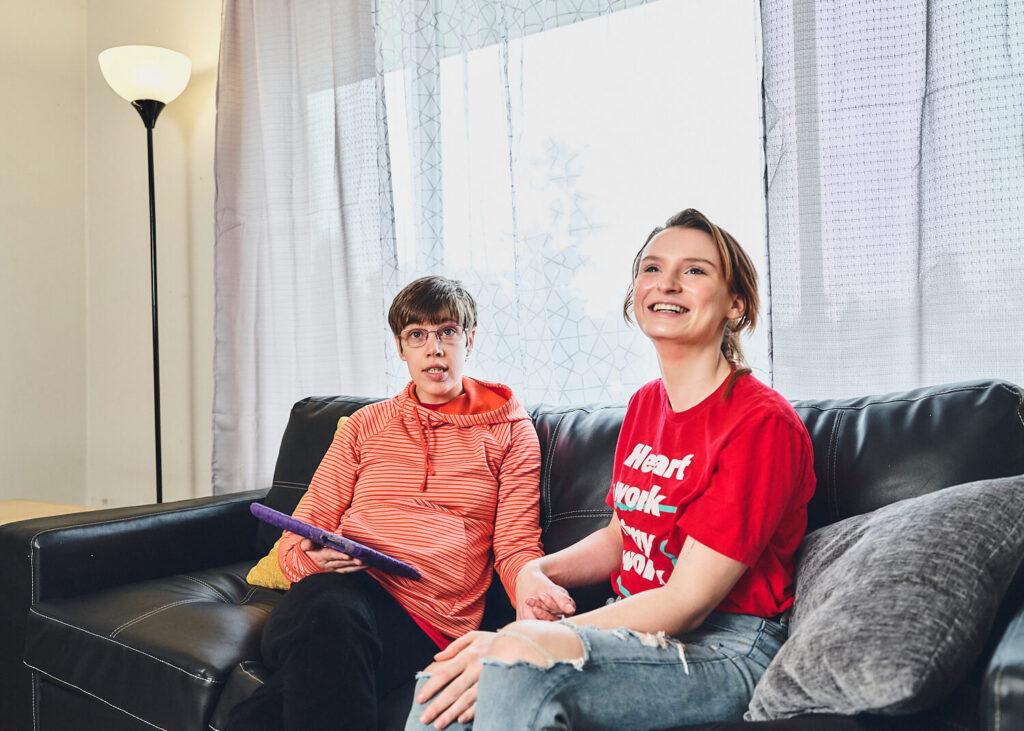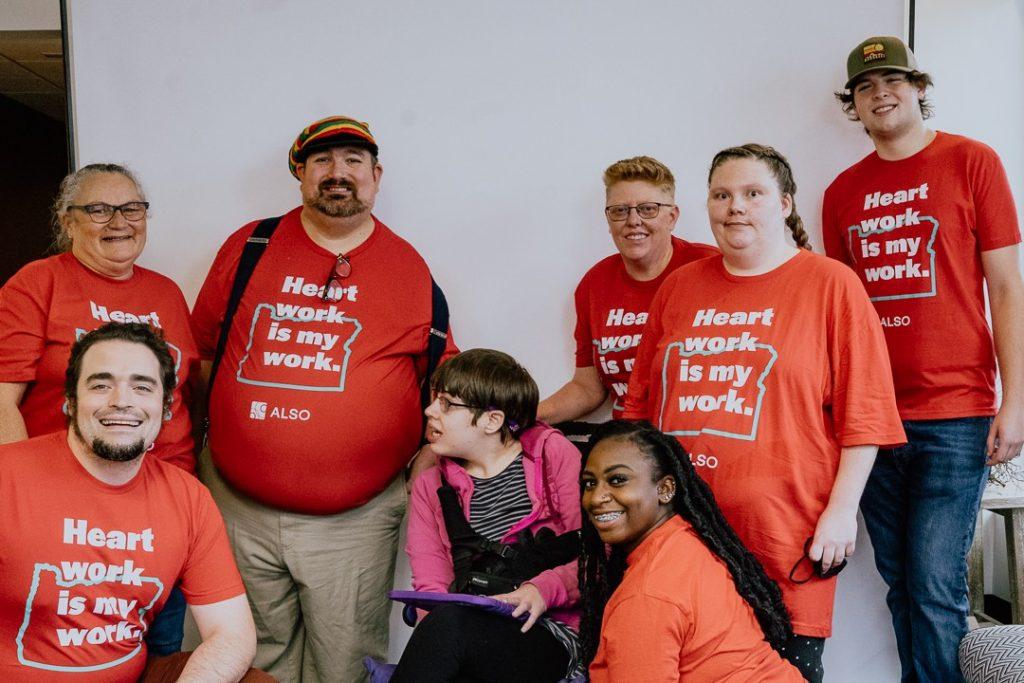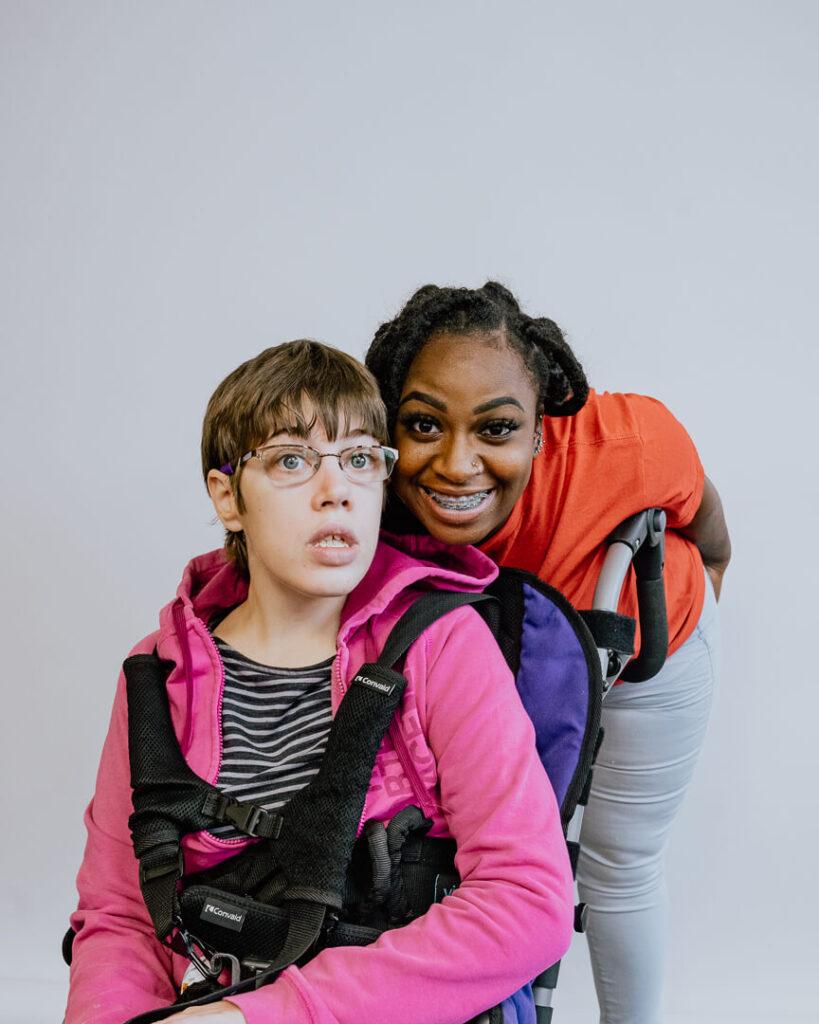Want to learn more about ALSO? Sign up for our virtual tour.
Want to learn more about ALSO? Sign up for our virtual tour.

“There is a myth that people with intellectual and developmental disabilities can never live on their own and that’s something that is not true. We’ve had family members being introduced to our organization that have said ‘there’s no way my child could ever live on their own.’ It’s not true at all. It’s just a matter of making it happen.”
Darrin Barnham, ALSO Director of Supported Living
Darrin’s statement provides excellent insight. Individuals with intellectual and developmental disabilities (I/DD) certainly do have the ability to take care of themselves and thrive in their own homes. However, adequate housing (that’s also affordable) is increasingly difficult to find in the U.S.
Let’s learn firsthand from ALSO direct support professionals (DSPs), managers, and administrators about current resources in housing opportunities for individuals with intellectual and developmental disabilities. We’ll explore the progress that’s been made and additional challenges on the horizon.

The Olmstead Decision of 1999 was pivotal in affirming that adults with disabilities had the right to live and thrive in the least restrictive environment of their choosing. In this landmark decision, the Supreme Court found that institutional living severely interferes with multiple aspects of daily living:
Another federal law, the Fair Housing Act (FHA) protects individuals with disabilities from housing discrimination in the rental and purchase of homes. It also requires that reasonable accommodation be made to allow for equal access to their dwelling and associated public areas.
Through state and federal law, policy changes, and the tireless efforts of advocates and self-advocates, the door was opened for nonprofit organizations, government entities, and other human services organizations. They have facilitated innovative community-based services and housing programs that really work for members of our society with I/DD.
ALSO offers in-home supports, which may occur in the home of a person with a disability who is living with their family, or possibly on their own. Examples include include getting assistance with academic/study skills or behavioral training. In-home supports are provided by way of an hourly billing platform.
Supported Living is more comprehensive than in-home supports. ALSO DSPs and managers collaborate with the people we support to create a unique, person-centered, individualized plan. The individual chooses where and how they live, and what supports they receive. This lays the foundation for equal opportunity, self-advocacy, and community inclusion.
Residential living consists of wrap-around services for those who benefit from structured assistance over a 24-hour period. At ALSO, our approach is still very person-centered. Each individual is supported in pursuing their unique interests, goals, and desires for the future.
“In supported living, we are able to ask those we support, ‘How do you see yourself living your best life? How can I support you to make sure that you’re able to get through each day, go on outings and be a part of your community?’ We want to give people options on how they want to live their life.”
Jackie Armbruster, ALSO Supported Living Manager
ALSO CEO, Brett Turner, who has worked for decades with people living with intellectual and developmental disabilities, has been encouraged by the progress thus far regarding disability rights and policies. Still, more work needs to be done, particularly in the area of affordable housing.
Jackie provides an historical perspective:
“When folks came out of institutions, this was supposed to open doors. People should have the opportunity to live on their own, where they want to live. This is made possible with the proper supports in place and having the freedom of choice that everyone one else experiences. What happened is that the affordable options end up being in more restrictive environments, either residential care facilities or in foster care settings.”
Jackie is right. Often, young adults who are capable of independent living must reside with their families because rental assistance, social security, and other supportive services aren’t sufficient for making ends meet.
LEARN MORE: About the population of persons with I/DD and other disabilities who rely on homeless shelters.
A 2020 data study commissioned by the Kuni Foundation addressed the mounting housing crisis. It’s estimated that, in the Pacific Northwest alone, at least 24,000 adults with I/DD are facing housing insecurity. This figure is based on 25-year-old data, therefore the number is likely to be much higher.
The challenges of securing housing resources for a loved one with I/DD is particularly daunting for low-income families. Additionally, there can be a lot of confusion in navigating funding streams for rental and other housing assistance.
The housing crisis not only impacts those who need support, but additionally, those that provide the support, and the community as a whole. One example is the growing population of older adults who are also caregivers for their kids with I/DD. When older adults approach the age of medical issues and disability, who is going to take care of their son or daughter? It represents a missed opportunity for the community if the person ends up in a group home.
People with disabilities play a vital role in the creation of a diverse, inclusive, and equitable society. Their inclusion promotes dignity, equality, and respect for us all.
There’s a serious shortage of accessible housing units for people with physical disabilities. Research indicates that over 15% of U.S. households include someone with a physical disability, yet only 6% of homes are accessible for people with disabilities. Furthermore, a fraction (20%) of those homes are actually occupied by people with a physical disability. Unfortunately, most accessible units are located in more expensive areas, making affordable rental housing almost impossible to find. This creates additional strain on low income households.
“At ALSO, we believe everyone deserves a safe, affordable, accessible place to call home. Today, there are not enough affordable and accessible housing options available for people experiencing a disability. This pushes many people with disabilities into housing and service situations they did not or would not choose.”
Brett Turner, ALSO CEO
LEARN MORE: Accessible Housing: Sam’s Home Tour.
For some, residential living is the right fit. These individuals get the services they need to help them live life to their full potential.
Those who don’t need 24-hour staff supervision, however, will experience disruptions in their independence. Essentially, they get over-served. What Jackie found is this:
“…a lot of times you can cause people to regress. Their potential was much higher, but because they are in a more restrictive environment, their independence decreases.”
Darrin Barnham has found that many would enter supported living if it wasn’t for the challenges of affordable and accessible housing for people with disabilities. Unfortunately, they end up in residential services even though Supported Living might be a better fit and offer more independence and autonomy and furthermore could create more opportunities for increased community inclusion.
So how do we break down this myth? As Darrin said…and we wholeheartedly agree, “It’s just a matter of making it happen.”
In fact, we have made it happen. That’s what Kerstin, the mother of Brooke Maroney, has shared.

Brooke has a severe intellectual disability with autism. Her parents passionately cared for Brooke until she was 17. By that time, her physical strength and her social needs became too much for her exhausted parents. After a disastrous experience at a substandard “group home,” Brooke returned to live with her overwhelmed parents. The stress could get to anyone. One harrowing night, the team at ALSO were called to a nearby bridge to talk Kerstin out of taking her own life…
“Brett and Darrin extended their hands to lift me from the devastation. They customized a program specifically to meet Brooke’s needs and pledged full transparency. That day, these compassionate strangers left my home the architects of my dream.”
With compassion, expertise, and a collaborative spirit, ALSO helped Brooke’s parents to shift their role from primary caregivers to involved parents. Brooke is now truly living her best life. She has her own apartment and adores the people who support her. She’s thriving in her new environment and is the happiest she’s ever been.
Because of the support team network at ALSO, families can be families again, and parents can be parents, not 24/7 caregivers. It can be taxing to be a caregiver and not everyone has the resources for appropriate housing. Supported living helps restore a positive family dynamic and encourages healthy family involvement.
For everyone we support, we start with this question: “What does your ideal situation look like?” That simple question has created opportunities that we didn’t know were possible.

Sign up for our newsletter to get our latest news, content, and job opportunities.
Help us ensure that everyone has the same opportunities in their home, workplace and community. Let’s make dreams!
